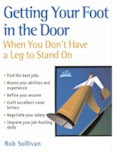To help with this decision, I have posted an online guide called 11 Questions To Consider Before Hiring A Career Coach.
Before you check out the article, let's see if you even need a career coach. To begin, ask yourself the following questions:
-
Have you ever thought to yourself?:
"I know I'd be great at that job if only someone would give me a chance" or "I would love that job, but I could never make any money doing that."
-
Do you struggle with the concept of networking and/or feel that you have fewer valuable contacts than others?
-
Do you ever find yourself apologizing for your age, level of experience, or education?
-
Have you sent out résumés for jobs you know you'd be perfect for and have not received a response?
-
Do you have trouble getting interviews or turning interviews into job offers?
-
Are interviews uncomfortable because you find it difficult to talk about yourself without feeling like you're bragging?
-
Given the economy, do you worry that you may have to settle for a job or salary below what you know you deserve?
-
Do you worry that your unemployment compensation and/or severance will run out before you find another job?
-
Have you been out of work longer than you ever expected?
-
Do you feel stuck in your current job or no longer find it satisfying?
-
Do you feel your job, and the jobs of your co-workers, are in jeopardy?
If you answered "Yes" to even one question above, working with a career coach could help you streamline your efforts.
If you answered "Yes" to more than 3 questions, the right career coach could help you shave weeks or months off your search. When you think about what you expect to earn in a typical week, the opportunity cost of NOT working with a coach is probably a lot higher than the investment you'd make with even the most expensive coach.

.jpg)